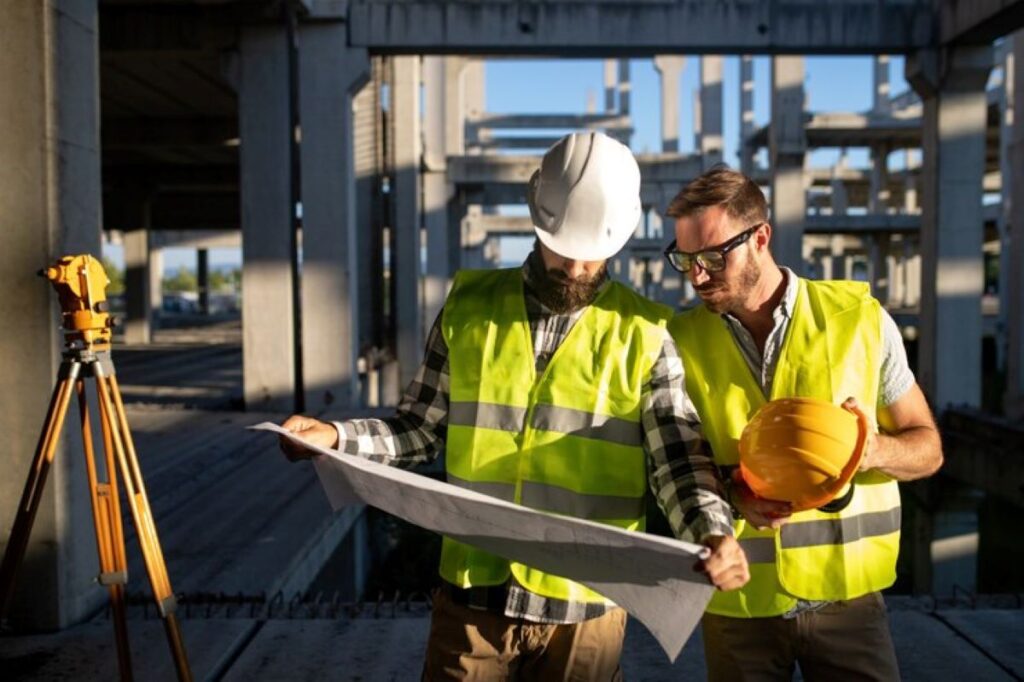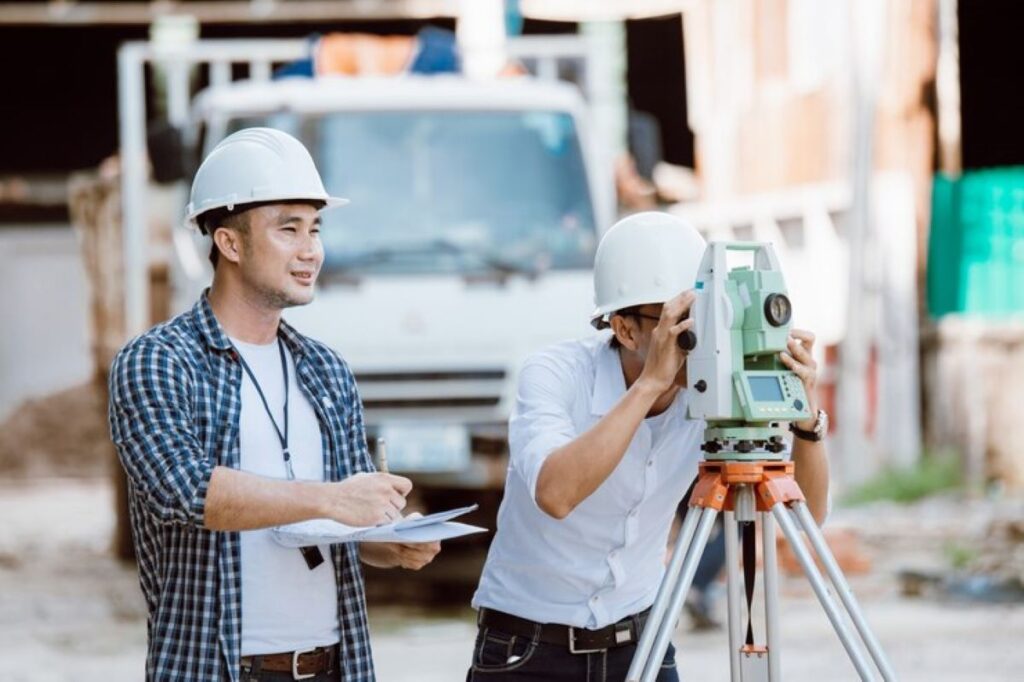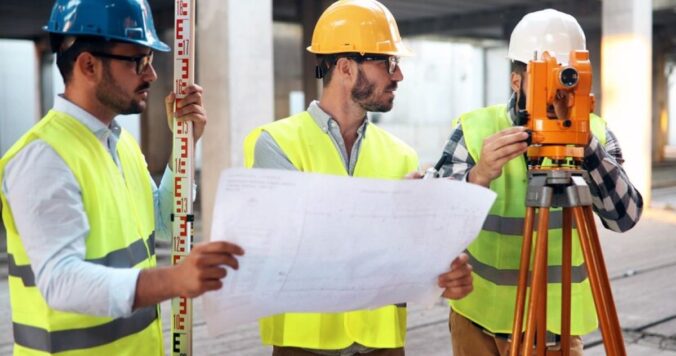The construction industry is one of the most heavily regulated sectors, with a myriad of compliance standards that must be adhered to throughout the lifecycle of a project. From initial planning to final execution, construction surveyors play a pivotal role in ensuring that these standards are met. This article explores the importance of construction surveyors in maintaining compliance, the various regulations they navigate, and the benefits they bring to construction projects.
The Role of Construction Surveyors
Construction surveyors are professionals who specialise in measuring and mapping land, ensuring that construction projects are built accurately and in accordance with legal and regulatory requirements. Their expertise is crucial at various stages of a construction project, from site selection to project completion.
Site Assessment and Planning
Before any construction can begin, a thorough site assessment is essential. Construction surveyors evaluate the land to determine its suitability for the intended project. This involves analysing topography, soil quality, and existing infrastructure. By identifying potential issues early on, surveyors help to mitigate risks and ensure that the project complies with local zoning laws and environmental regulations.
In addition to assessing the physical characteristics of the site, construction surveyors also play a key role in planning. They work closely with architects and engineers to create accurate site plans that reflect the project’s requirements. This collaboration is vital for ensuring that all aspects of the project align with compliance standards. The surveyor’s insights can influence the design process, as they provide critical data that can lead to adjustments in the layout or materials used, ultimately enhancing the project’s feasibility and sustainability.
Regulatory Compliance
Compliance with regulations is a fundamental aspect of any construction project. Construction surveyors are well-versed in the myriad of laws and standards that govern the industry, including building codes, safety regulations, and environmental laws. Their expertise ensures that projects adhere to these requirements, minimising the risk of legal issues and costly delays.
Moreover, construction surveyors are responsible for obtaining the necessary permits and approvals from local authorities. This process can be complex and time-consuming, but with the guidance of a skilled surveyor, projects can navigate these bureaucratic hurdles more efficiently. They often liaise with government agencies, providing detailed documentation and reports that substantiate the project’s compliance with relevant regulations. This not only facilitates a smoother approval process but also fosters a cooperative relationship between the construction team and regulatory bodies, which can be beneficial for future projects.
Furthermore, construction surveyors often conduct regular inspections throughout the construction process to ensure ongoing compliance with the established standards. These inspections help to catch any deviations from the approved plans early, allowing for timely corrections that can save both time and money. Their role extends beyond mere compliance; they are integral to maintaining the integrity and safety of the construction site, ensuring that all work is executed to the highest standards of quality and precision.
Importance of Accurate Measurements
Accurate measurements are the cornerstone of successful construction projects. Construction surveyors employ advanced technology and methodologies to ensure precision in their work. This accuracy is not only vital for the structural integrity of the project but also for compliance with regulatory standards.
Utilising Advanced Technology
Modern construction surveyors leverage cutting-edge technology such as GPS, laser scanning, and drones to gather data with unparalleled accuracy. These tools allow for detailed mapping and analysis of the construction site, ensuring that measurements are precise and reliable.
By utilising such technology, surveyors can identify potential discrepancies early in the project, allowing for timely adjustments. This proactive approach not only enhances compliance but also contributes to the overall efficiency of the construction process. Furthermore, the integration of Building Information Modelling (BIM) with these technologies enables surveyors to create comprehensive 3D models of the construction site, facilitating better visualisation and planning. This not only aids in the identification of potential issues but also enhances collaboration among various stakeholders, ensuring that everyone is on the same page throughout the project lifecycle.

Mitigating Risks
Inaccurate measurements can lead to significant risks, including structural failures, safety hazards, and legal complications. Construction surveyors play a crucial role in mitigating these risks by ensuring that every aspect of the project is accurately measured and documented.
By providing precise measurements and thorough documentation, construction surveyors help to safeguard the interests of all stakeholders involved in the project. This includes contractors, clients, and regulatory bodies, all of whom rely on accurate data to make informed decisions. Additionally, the meticulous documentation provided by surveyors serves as a vital record for future reference, particularly in the event of disputes or claims. The importance of this documentation cannot be overstated, as it not only protects the integrity of the project but also fosters trust and transparency among all parties involved. Moreover, with the increasing emphasis on sustainability in construction, accurate measurements also play a pivotal role in ensuring that projects adhere to environmental regulations and standards, further highlighting the multifaceted importance of precision in the construction industry.
Ensuring Safety Standards
Safety is paramount in the construction industry, and construction surveyors are instrumental in ensuring that safety standards are met. Their work not only contributes to the structural integrity of the project but also protects the health and safety of workers and the public.
Identifying Hazards
Construction surveyors are trained to identify potential hazards on the construction site. This includes assessing the terrain for stability, identifying underground utilities, and evaluating environmental risks. By conducting thorough assessments, surveyors can recommend measures to mitigate these hazards, ensuring a safer working environment.
Furthermore, their expertise in interpreting safety regulations allows them to guide project teams in implementing best practices. This proactive approach to safety not only protects workers but also enhances the overall reputation of the construction firm. In addition to their technical skills, surveyors often engage in training sessions for site personnel, ensuring that everyone is aware of potential risks and the protocols in place to manage them. This collaborative effort fosters a culture of safety, where workers feel empowered to voice concerns and contribute to maintaining a secure site.
Compliance with Safety Regulations
Construction surveyors ensure that all safety regulations are adhered to throughout the project. This includes compliance with Occupational Health and Safety (OHS) standards, which are designed to protect workers from accidents and injuries. By conducting regular inspections and assessments, surveyors help to maintain a safe working environment.
In the event of an incident, the documentation provided by construction surveyors can be invaluable. Their detailed records of site assessments and compliance checks can be used to demonstrate adherence to safety standards, protecting the construction firm from potential legal repercussions. Moreover, these records serve as a historical account of safety practices on the site, allowing for continuous improvement in safety protocols. By analysing past incidents and near misses, surveyors can identify trends and implement changes that further enhance safety measures, ultimately leading to a reduction in workplace accidents and fostering a more resilient construction culture.
Streamlining Project Management
Effective project management is essential for the success of any construction endeavour. Construction surveyors contribute significantly to this process by providing accurate data and insights that inform decision-making.
Facilitating Communication
Construction surveyors act as a bridge between various stakeholders, including architects, engineers, contractors, and clients. Their expertise allows them to communicate complex technical information in a way that is easily understood by all parties involved. This facilitates collaboration and ensures that everyone is on the same page regarding compliance standards and project requirements.
Moreover, by providing timely updates and reports, surveyors help to keep the project on track. This transparency is crucial for maintaining stakeholder confidence and ensuring that the project meets its deadlines.
Enhancing Efficiency
By providing accurate measurements and assessments, construction surveyors enhance the overall efficiency of the project. Their work helps to minimise delays caused by errors or discrepancies, allowing the construction team to focus on delivering the project on time and within budget.
Furthermore, their ability to identify potential issues early in the process allows for proactive problem-solving, reducing the likelihood of costly rework and ensuring compliance with all relevant standards.

Cost-Effectiveness of Engaging Construction Surveyors
Investing in the expertise of construction surveyors can lead to significant cost savings in the long run. While there may be initial costs associated with hiring surveyors, the benefits they bring to a project far outweigh these expenses.
Avoiding Costly Delays
One of the primary advantages of engaging construction surveyors is their ability to identify potential issues before they escalate into major problems. By conducting thorough assessments and ensuring compliance with regulations, surveyors help to avoid costly delays that can arise from legal disputes or safety violations.
Additionally, their accurate measurements and documentation reduce the likelihood of errors that can lead to rework, further saving time and money. In a competitive construction environment, these cost savings can be a significant advantage.
Optimising Resource Allocation
Construction surveyors provide valuable insights that inform resource allocation throughout the project. Their assessments help project managers to determine the most efficient use of materials, labour, and equipment, ensuring that resources are allocated effectively.
By optimising resource allocation, construction surveyors contribute to the overall cost-effectiveness of the project, allowing firms to maximise their return on investment.
Conclusion
In conclusion, construction surveyors are essential for meeting compliance standards in the construction industry. Their expertise in site assessment, regulatory compliance, and accurate measurements ensures that projects are executed safely and efficiently. By facilitating communication and enhancing project management, surveyors play a crucial role in the success of construction endeavours.
Moreover, the investment in construction surveyors can lead to significant cost savings by avoiding delays and optimising resource allocation. As the construction industry continues to evolve, the role of construction surveyors will remain vital in navigating the complexities of compliance and ensuring the successful delivery of projects.
For construction firms looking to enhance their compliance efforts and improve project outcomes, engaging qualified construction surveyors is not just a recommendation; it is a necessity. Their contributions are invaluable in creating safe, efficient, and compliant construction environments.
Related : Key Benefits of Conducting a Thorough Construction Survey Early On

Leave a Reply